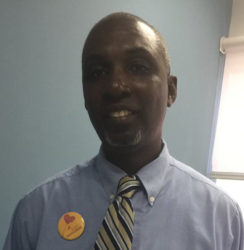The National Assembly on Monday night adopted the second report of the Committee on Appointments, paving the way for the appointing of the Director and Deputy Director of the Financial Intelligence Unit (FIU).
However, during the debate on the motion for the adoption of the report, the opposition PPP/C maintained that it could not support the appointment of the Deputy Director as its speakers said the process used to identify the candidate was not consistent with the one used to identify the Director.
Early Monday afternoon, Chairman of the Committee, Minister of Public Health Dr. George Norton tabled the report that identified Matthew Langevine, a manager at Scotiabank, as the consensus choice for FIU Director. It also identified Abiose Thomas, Financial Director of Guyana Telephone and Telegraph Company (GTT), as his Deputy, by way of a slim majority vote of five to four.
PPP/C MP Juan Edghill was one of the two speakers from the opposition and it was he who indicated that they were not in support of Thomas’ appointment.
According to him, at one of the meetings at which three members of the Committee were absent, the majority of those present named Alicia Williams—who is presently the attorney attached to the FIU—as one of the top three ranked candidates, while only two named Thomas as being among the three. Absent from that meeting were government Chief Whip Amna Ally, Minister of Public Infra-structure David Patterson and PPP/C member Bhagmattie Veerasammy. Because of the absence of the members, Edghill said it was decided that there would be further deliberation and another meeting was planned to address the particular appointment.

However, at the next meeting, he said, there appeared to be a “somersault on Ms. Alicia Williams, who six members of the committee found to be suitable… and who scored very highly.” He said she seemed to have disappeared off the radar and Thomas, a candidate that only had two nominations, was considered to be the preferred candidate. As a result, he said the opposition does not support Thomas’ appointment because the process that was used was not consistent with the one used for the post of Director.
“The country is being robbed of one of the finest persons who is well placed to serve as the Deputy Director and there is no explanation as to why she was not considered suitable for the job,” Edghill declared.
At one point during Edghill’s narration of the events, there were shouts of “lie, lie” and opposition Chief Whip Gail Teixeira objected to this, while naming Ally and Minister of Finance Winston Jordan as being the loudest offenders.
“It is wholly improper to be using that term in this House and I would ask members not to let us have to speak about it again,” Speaker Barton Scotland commented after the objection from Teixeira.
‘Democratic process’

Minister Patterson, in his presentation, said he thought it was an uncontentious motion and accused Edghill of being “economical with the truth” in his presentation. He said there was nothing “sinister” in the selection of Thomas and that a “democratic process” was utilised. He said it was the same process used in the selection of the director.
“You have to wonder, Sir—and I do wonder—why is it we, as nine members tasked to arrive at two nominees for certain positions, cannot accept a democratic process?” he questioned, while accusing Edghill of attempting to pass inaccurate information on Thomas to the Committee.
The latter assertion was objected to by Teixeira, who said that it was not true and this saw a back and forth between members of the two sides.
“What took place at the Committee of Appointments really ought to be there, to be left there, except to the general statements to which the House would benefit from…,” the Speaker subsequently cautioned.
Edghill later said that he brought to the attention of the Committee information that was provided by a candidate that attended the interview that “I know not to be correct.”
Prior to this heated discourse, Edghill had pointed out that it was the first time a committee was involved in interviewing candidates for such positions.
He stated that the Committee would not have gotten this far if the opposition members had not insisted on prioritising the process of finding the Director and Deputy Director and other officers for the unit as prescribed in the Anti-Money Laundering and Countering the Financing of Terrorism (AML/CFT) laws. He said it was at the very second meeting of the committee, while they had still been considering the rights commissions, that Teixeira asked if a Director was in place at the FIU. He said while they were initially told that there was, it was later learnt the office holder’s contract had expired. As a result of this, the process was moved forward.
“This needs to be stated in the House because it is contrary to what was reported in the media… where it was said that the opposition was stalling the process of the appointment of the FIU and that must be debunked because, Sir, it is not true,” Edghill said.
According to Edghill, there was full co-operation and full participation from the opposition members driving the process “in getting to the place where we are tonight.”
Some applicants were disqualified even before the shortlist because of what was “deemed politically exposed persons.” They were asked to pronounce on themselves based on the Act and some very eminently qualified persons were deemed ineligible because of that consideration and one candidate could not have gone forward because a brother is a member of the National Assembly.
However, Edghill said what is of concern is that the nominations are being advanced in an environment where there is no AML/CFT Authority.
“It is like putting the cart before the horse because we don’t have an Authority and the FIU is to function in the construct of an Authority,” he said.
He expressed the hope that soon the Authority will be a reality.
But Minister Patterson announced that the process for the setting up of the Authority has started and revealed that the reason why the process is not yet completed is because they are awaiting responses from all the entities that were invited to submit nominees to be members.
‘Highly irregular’
Before the report was debated on Monday night, Teixeira again expressed her discomfort at proceeding on the grounds that members had not seen a copy of the report or the motion for it to be debated.
Because the motion was not before the House at the beginning of the session, Prime Minister Moses Nagamootoo, after being given consent by the Speaker, moved for a suspension of the Standing Orders to enable the Assembly to proceed with the adoption of the report and address the matters of the two appointments.
Calling it “highly irregular,” Teixeira said she was very displeased at the suspension of the Standing Orders, while noting that there had been too many—10—in the last year since the current Parliament has been sitting.
According to the Committee’s report, eight persons were interviewed for the position of Director and two were unanimously identified as the top candidates. It was agreed that the Commissioner of Police would execute a background check on the top ranked candidate and her named partner. Members of the committee subsequently received the response of the Commissioner of Police and decided that the top ranked candidate was no longer eligible for consideration for appointment of the Director of the FIU, the report said. The person was not named.
As a result, by consensus it was decided that Langevine be given the position.
As it relates to Thomas, the report said that nine persons were initially interviewed and later seven of those were further interviewed by the committee and three were short-listed.
“There were differences of views as the opposition members felt that the current legal adviser of the FIU was the candidate who had the highest scores and the highest number of nominations as well as the most experience in the AML/CFT framework and should be given the position, whilst the government members were supportive of Mr Abiose Thomas and were of the view that his experience should merit him being given the position. The matter was eventually put to the vote and the nomination of Mr Abiose Thomas received five votes and the nomination of Ms. Alicia Williams received four votes,” the report said.
The FIU is the entity tied directly to oversight of the Special Organised Crime Unit (SOCU) and is required to be operational under the anti-money laundering legislation. It has been without a head since the end of last year after its then director Paul Geer’s contract expired. The unit is a critical component of the anti-money laundering legislation and the government has been criticised for its failure to ensure that a director is appointed and that the unit becomes fully operational. Compliance with international standards for anti-money laundering legislation has seen years of bickering between the two sides of Parliament. Guyana continues to be on a Financial Action Taskforce watch list to ensure full compliance.




